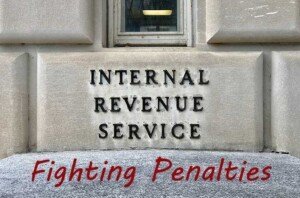What Taxpayers Need to Know About Fighting IRS Penalties
Can you get rid of an IRS penalty? There are many reasons why the IRS may assess a penalty against a delinquent taxpayer. However, IRS penalties may be challenged at any stage of the penalty assessment process and be granted in limited cases. This can save taxpayers significant money if they act promptly.

Penalties assessed for the following reasons may be eligible for relief:
- Failing to file a tax return
- Failing to pay on time
- Failing to deposit certain taxes as required
- Other penalties as applicable.
Penalty relief is offered by the IRS in the following situations:
- Reasonable Cause. The IRS will consider any sound reason such as natural disaster, inability to obtain records, death, serious illness, or other reason which establishes that the taxpayer used all ordinary business care and prudence to meet the tax obligations but was unable to do so.
- Administrative Waiver and First Time Penalty Abatement. Taxpayers may be eligible for relief if they fall under the First Time Penalty Abatement and in some situations where they received incorrect oral advice from the IRS or there was a formal government directive providing penalty relief because of a natural disaster or catastrophic event.
- Statutory Exception. The tax law provides for specific exceptions including if the taxpayer received incorrect written advice from the IRS.
Requesting Penalty Abatement
Taxpayers can challenge a penalty either in writing or orally before a penalty is assessed, or after it is paid. The initial request for penalty relief may occur either:
- during or after an IRS examination (but before a penalty is assessed), with a tax return that is either filed or paid late, or
- after assessment of the penalty and notification.
The IRS will review the taxpayer’s entire file to determine if relief is warranted and either grant or deny a request.
Appeals
Upon receipt of a denial of the penalty abatement request, which can be either written or oral, the taxpayer has 30 days to make a written appeal of the denial. Appeals Officers can consider whether the penalty was correctly asserted and whether the taxpayer is liable for the penalty. Officers are instructed to do this before considering other grounds such as abatement for reasonable cause. Penalties can be settled for less than the full amount based on the hazards of litigation.
The taxpayer will be notified in writing of the decision. After an adverse decision, the taxpayer can still challenge the penalty by paying the contested penalty and then filing a Form 843, Claim for Refund, and pursuing a refund.
Challenging a penalty assessment can potentially save taxpayers significant money. If you have been assessed a penalty by the IRS, contact us to discuss whether you qualify for abatement.


